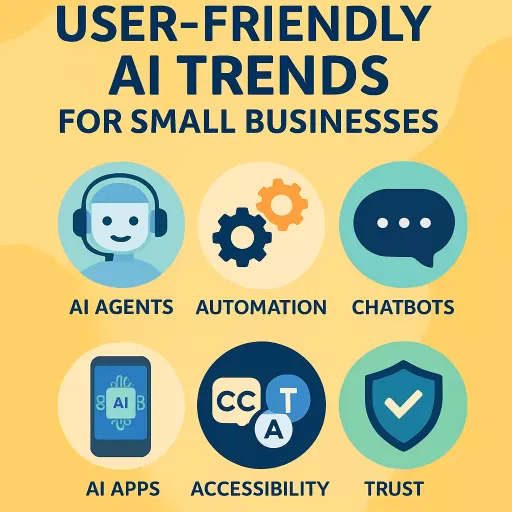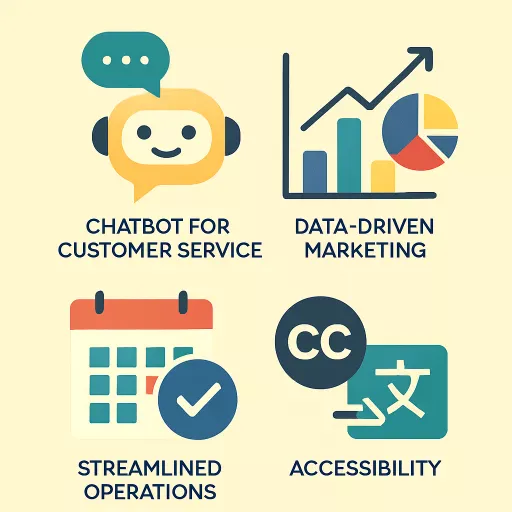Artificial Intelligence (AI) is no longer the exclusive domain of tech giants and data scientists. In 2025, user-friendly AI tools are empowering small and medium businesses across Australia and the world to work smarter, not harder. Whether you’re running a local café, a digital agency, or a family-owned retail store, AI can help you streamline operations, boost customer satisfaction, and unlock new growth opportunities—without needing a computer science degree.

- AI is now simple and accessible for small businesses, with user-friendly tools that automate tasks, deliver insights, and enhance customer experiences—no technical background needed.
- Modern AI tools like chatbots, analytics platforms, and content creators are transforming customer service, marketing, and daily operations, helping businesses save time and work more efficiently.
- AI-powered automation streamlines repetitive tasks and supports smarter, data-driven decisions, allowing business owners to focus on growth and innovation.
- Integrating AI doesn’t have to be overwhelming—start by identifying your business needs, choose easy-to-use tools, educate your team, and implement changes gradually for the best results.
- Staying informed about AI trends and using AI ethically and transparently will keep your business competitive, build customer trust, and ensure you’re ready for the future.
What Is AI and Why Should Small Businesses Care?
At its core, artificial intelligence refers to software and systems that can mimic human intelligence—learning from data, making decisions, and even improving themselves over time. For small business owners, this means access to tools that can automate repetitive tasks, provide deep insights, and personalise customer experiences in ways that were once unimaginable.
The latest research shows that over 90% of leading businesses are investing in AI, and the technology is rapidly becoming more accessible and affordable for everyone. The real question is no longer “Should I use AI?” but “How can I use AI to get ahead?”
The 2025 Landscape: Key Trends in User-Friendly AI

AI is evolving at breakneck speed. Here are the most important trends shaping user-friendly AI tools for small business in 2025:
1. AI Agents: Your New Digital Teammates
AI agents are autonomous systems that can perform tasks on your behalf—think of them as digital staff members who never sleep. Unlike traditional software, these agents can interpret requests, make decisions, and even escalate complex issues to humans only when needed. Gartner predicts that by 2028, a third of all business software will include agentic AI, up from less than 1% in 2024 (Forbes, 2025).
2. Automation for Everyday Tasks
AI-powered automation is now handling everything from appointment scheduling to inventory management. This frees up your time to focus on what matters most—growing your business and serving your customers (Transcribe, 2025).
3. Conversational AI and Chatbots
Text and voice-based conversational AI are becoming mainstream, allowing businesses to offer instant, 24/7 customer support. These tools are now so advanced that they can handle complex queries, provide personalised recommendations, and even convert text articles into audio for greater accessibility.
4. Small Language Models (SLMs)
Not every business needs a supercomputer. Compact AI models can now run on everyday devices, making powerful AI accessible without expensive hardware. Microsoft’s Phi-3, for example, is a smartphone-friendly model that can handle coding, maths, and more.
5. AI for Accessibility and Inclusion
AI is helping businesses reach wider audiences by generating captions, translating content, and creating alternative text for images. This not only improves accessibility but can also attract new customers and foster loyalty (Digital Content Next, 2025).
6. Trust, Transparency, and Ethical AI
As AI becomes more integrated into business operations, transparency and ethical use are non-negotiable. Customers want to know how AI is being used, and businesses that prioritise ethical AI are building stronger trust and loyalty.
Top User-Friendly AI Tools for Small Businesses in 2025
With so many options on the market, it’s important to choose tools that are genuinely easy to use and deliver real value. Here are some of the best AI tools for small business this year:
- Chatbots and Virtual Assistants: Tools like ManyChat, Chatfuel, and Tars automate customer interactions on your website and social media, providing instant support and freeing up your team for more complex tasks.
- AI-Powered Analytics: Platforms such as Google Analytics and Microsoft Clarity use AI to uncover patterns in your website traffic and customer behaviour, helping you make smarter, data-driven decisions.
- Content Creation and Editing: Grammarly, Hemingway Editor, and Jasper AI help you craft clear, engaging marketing content, blog posts, and emails.
- Scheduling and Calendar Management: Calendly and Acuity Scheduling use AI to automate appointment bookings, send reminders, and reduce no-shows.
- Social Media Management: Buffer, Hootsuite, and Later leverage AI to optimise your posting schedule, analyse trends, and suggest content ideas.
- AI for Accessibility: Tools like Otter.ai and Descript generate real-time captions and transcripts, making your content more accessible to everyone.
For a comprehensive list and reviews, check out Upmetrics’ guide to the best AI tools for small businesses.
Practical Applications: How AI Can Transform Your Business

Let’s break down how these tools can make a real difference in your day-to-day operations:
Automating Customer Service
Implementing a chatbot on your website or Facebook page means customers can get answers to common questions instantly, even outside business hours. This not only improves customer satisfaction but also reduces the workload on your staff.
Data-Driven Marketing
AI-powered analytics can reveal which marketing campaigns are working, what your customers really want, and where you should focus your efforts. This allows you to tailor your messaging and offers for maximum impact.
Streamlining Operations
From automating appointment bookings to managing inventory, AI can handle repetitive tasks with speed and accuracy. This means fewer errors, less admin, and more time for you to focus on growing your business.
Enhancing Accessibility
AI tools can automatically generate captions for videos, translate your website into multiple languages, and create alternative text for images. This not only helps you reach a broader audience but also demonstrates your commitment to inclusivity.
How to Integrate AI Into Your Business—Without the Overwhelm
Adopting new technology can feel intimidating, but it doesn’t have to be. Here’s a step-by-step approach to integrating user-friendly AI tools into your business:
- Identify Your Needs: Start by pinpointing the areas where AI could have the biggest impact—customer service, marketing, operations, or accessibility.
- Choose the Right Tools: Look for solutions that are known for their ease of use and strong customer support.
- Educate Your Team: Provide basic training and resources to help your staff get comfortable with the new tools.
- Start Small: Implement one tool at a time, measure the results, and expand as you gain confidence.
- Stay Informed: AI is evolving rapidly. Subscribe to industry newsletters, attend webinars, and keep an eye on the latest trends to ensure your business stays ahead of the curve.
The Future of AI in Small Business: What’s Next?
The future of AI in small business is incredibly bright. We’re seeing the rise of AI agents that can handle complex tasks, small language models that bring powerful AI to everyday devices, and tools that make businesses more accessible and inclusive than ever before. As AI continues to evolve, the businesses that thrive will be those that embrace these changes, prioritise ethical use, and focus on delivering real value to their customers.
For a deeper dive into the biggest AI trends of 2025, check out Forbes’ analysis.
Conclusion
Embracing user-friendly AI tools is no longer optional—it’s essential for staying competitive in today’s fast-moving business landscape. By starting small, choosing the right tools, and focusing on your customers’ needs, you can harness the power of AI to streamline your operations, enhance customer experiences, and drive growth.
Remember, the goal isn’t to replace people with machines, but to empower your team to do their best work. With the right approach, AI can be your business’s most valuable ally.


